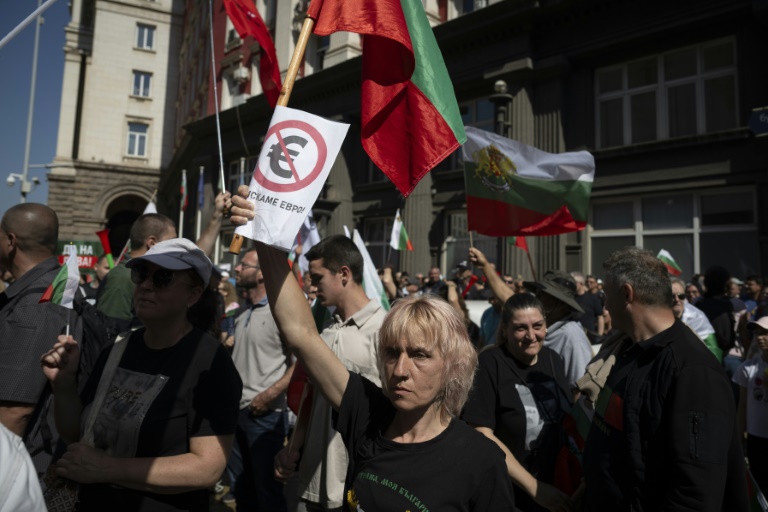Not everyone in Bulgaria welcomes the push to adopt the euro (Nikolay DOYCHINOV)
The European Commission gave the green light on Wednesday for Bulgaria to adopt the euro from next year, putting the Balkan country on course to become the 21st member of the single currency area.
The commission said Bulgaria had fulfilled the strict criteria “intended to ensure that a country is ready to adopt the euro and that its economy is sufficiently prepared to do so”.
The European Central Bank also gave a positive opinion, hailing Bulgaria’s “tremendous dedication to making the adjustments needed”.
Bulgarian Prime Minister Rossen Jeliazkov hailed “a remarkable day” that followed “years of reforms, commitment and alignment with our European partners”.
The push has, however, sparked a backlash from many Bulgarians, with protests and recent surveys showing nearly half of those questioned opposed adopting the euro — fearing painful economic consequences.
– ‘Just want to live well’ –
About 1,000 people demonstrated Wednesday in front of the National Assembly building in the centre of Sofia, holding signs that read “Preserve the Bulgarian lev”, “No to the euro” and “The future belongs to sovereign states”.
The gathering was organised by the opposition pro-Russian Vazrazhdane party.
In the streets of Sofia, several people welcomed the European Commission’s green light.
“It will give us greater freedom and make traveling abroad easier,” a 36-year-old software developer who just gave her name as Akseniya told AFP, though she added feeling “a bit of nostalgia”.
“We are losing a bit of our identity, our lev,” she said.
“Whether it’s in euros, dollars, or levs, I just want to live well,” Svilen Manavski, 61, a construction worker said in the EU’s poorest member.
Bulgaria has had a rocky road to joining the eurozone: the nation has been plagued by political turmoil with seven elections in three years — the last in October 2024.
The approval by the EU’s executive body comes 18 years after Bulgaria joined the bloc.
“Congratulations, Bulgaria!” commission president Ursula von der Leyen said.
With a population of 6.4 million, Bulgaria has spent several years preparing its economy to join the eurozone.
Bulgaria still needs the approval of the EU’s finance ministers, who are expected to give their full backing in July, before it formally adopts the euro as of January 1, 2026.
“Today’s report is a historic moment for Bulgaria, the euro area and the European Union,” said EU economy chief Valdis Dombrovskis.
Story Continues
